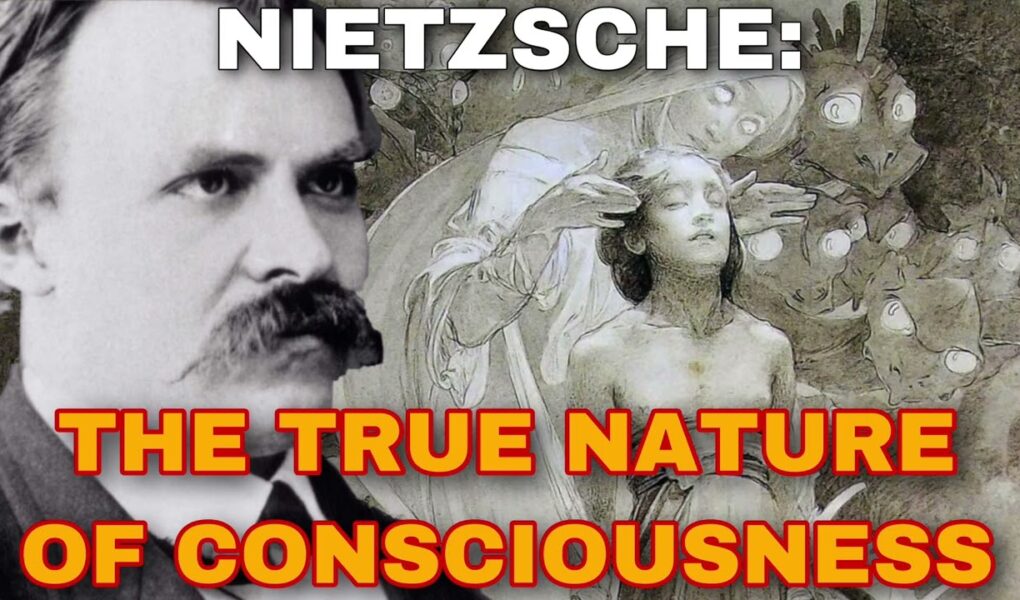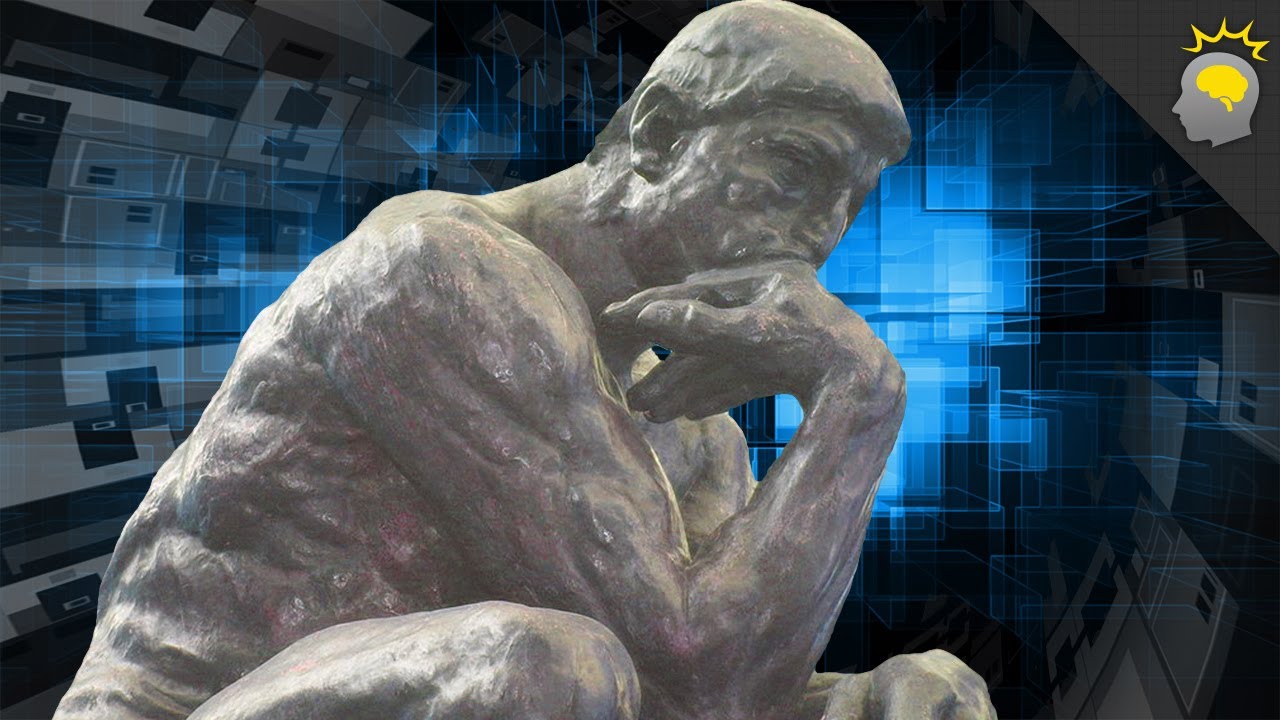essentialsalts
Support us on Patreon: www.patreon.com/untimelyreflections
Another episode on a single passage: The Gay Science, book V, aphorism 354: “The Genius of the Species”. One of the most thought-provoking passages in Nietzsche’s work, he expounds on his hypothesis that all consciousness is a product of human sociality, and was only necessary as a net of communication between human beings. This has dire implications for Nietzsche’s aspirations to individualism, and makes suspect everything to him which enters into consciousness. He believes that the deeper, more profound aspects of human life remain, ultimately, untranslatable.
Episode art: Alphonse Maria Mucha – La Pater (1899)
#nietzsche #philosophy #consciousness #mind #linguistics #language #reading
Source




00:15 📚 Nietzsche's aphorism in "The Gay Science," Book 5, Section 354, titled "The Genius of the Species," is essential for understanding his approach to human consciousness and thought.
01:13 📝 Nietzsche's work in the fifth book of "The Gay Science" marks a transition in his philosophy and lays the foundation for his mature ideas, including the concept of the "Ubermensch" (higher man).
03:33 🧠 Nietzsche explores the development of human consciousness, arguing that it is shaped by fear, force, and the need to suppress impulses, leading to self-awareness and morality.
11:12 🦁 Nietzsche discusses how pleasurable impulses can evolve independently of their original purposes, using the example of the sexual drive in humans.
15:13 ⚖ Nietzsche contrasts master morality (where strength and power are valued) with slave morality (which emphasizes meekness, suffering, and otherworldly ideals), highlighting the impact of Christianity on moral values and the rejection of physical reality.
31:33 🤔 Nietzsche explores the question of why consciousness exists, suggesting it may have arisen due to the need for communication.
36:04 🗣 Consciousness, according to Nietzsche, is closely tied to the capacity for communication, which developed over generations due to the need for collective survival and coordination.
40:18 📚 Language and communication have evolved beyond basic survival needs, giving rise to artists, orators, preachers, and writers who use language for more than mere survival.
42:10 🧠 Nietzsche connects communication with the power to command and obey, emphasizing that communication's purpose is not just equal communion but also coordination and cooperation in the external world.
46:39 🗣 Nietzsche suggests that consciousness is primarily a product of communication among humans, and without communication, consciousness would seem odd and disposable.
53:37 🙌 Nietzsche argues that individual self-consciousness emerges from collective needs and communication, highlighting that our thoughts are shaped by the character of consciousness, which is a result of herd utility.
01:03:08 🤔 Nietzsche criticizes consciousness, calling it a corruption and a disease, emphasizing that conscious thought often leads to a reduction of depth, falsification, and generalization of experience.
01:04:33 🧠 Nietzsche views consciousness as a form of decadence and corruption because whatever becomes conscious becomes cheapened, making intellectual and spiritual life shallow.
01:05:17 💪 Collective power, cooperation, and hierarchy based on values are significant factors in human development, according to Nietzsche, as they sustain and help human groups surpass others.
01:06:57 🐾 Nietzsche suggests that animals live historically, unburdened by memories or fears of the future, which contrasts with human self-consciousness and temporal awareness.
01:09:01 🧘 Nietzsche emphasizes the utility of non-consciousness and acting on impulse, highlighting the importance of suspending judgment and dismissing doubts when taking action.
01:11:20 🗣 Nietzsche rejects metaphysical claims, stating that humans lack an organ for truth. He also critiques the concept of utility, highlighting its subjective and potentially calamitous nature.
When the inner world of man and its original consciousness is completely displaced by a synthetic mind you might do well to question What the meaning of survival is for such an existence? first of all It is an assumption there was no self reflection possible prior language because certain animals lacking in language are still aware of themselves. If not recognizably why not still meaningfully? All the More if the authentic individual is retained in such a state? Consider how words hijack emotions and sensations. They maintain and amplify a grasp upon sensations beyond what is reasonable or necessary. This is so because for every sensation or feeling there is now an inextricably bound association to thought once the concept is learned. Thus the machinery of language and the so called genius beyond the individual determines how this individual shall suffer and even perhaps nearly all that he experiences. What sort of consciousness is it that the existence of the original individual has already been sacrificed before "HE" can even realize he is lost? He can nolonger say he is identified with the collective since he now simply IS this collective. Whatever he really was has either been lost or submerged in a state of suspended animation. But Nietzsche seemingly never explicitly considered What meaning could be attributed to any collective species ( its values) if there can nolonger simultaneously exist a meaningfully authentic individual remaining to have a judgement.
When the inner world of man and its original consciousness is completely displaced by a synthetic mind you might do well to question What the meaning of survival is for such existence? It is funny to assume there was no self reflect in consciousness without language because certain animals lacking in language are still aware of themselves. Because words can hijack emotions they can maintain or amplify sensations beyond what is reasonable or necessary.This is so because for every sensation of feeling there is now an association I thought concepts by which it is inextricably bound. Does the machinery of language and the genius beyond the individual determines how this individual shall suffer. What sort of consciousness is that it's not a strange collective minds wish the individual has been lost to. He cannot say he is identified with the collective mind he now simply IS this collective. Whatever he really was has either been lost or submerged in a state of suspended animation. Had Nietzsche ever considered What meaning then can be attributed to the aims of a collective species if there is no true individual that exists to judge?
Disgusting > everything is consciousness
although he laid out the hard problem of consciousness at the begining, i was hoping he would go into it further ie why we have subjective experience in the first place. the stuff about communication feels more like the "easy problem".
It fascinates me that Nietzsche is probably referring to a psychopath as the higher man. The similarities are uncanny
20:00 the conscious intellect and philosophising.
Absolutely brilliant work!
Nonsense , try to survive without it.
genealogy
To me the conscience is just your body telling you what is best. Golden rule, justice, etc…. Doesn’t seem to be dependent on society entirely.
Great analysis and breakdown, I find your explanations of Nietzsche the most accurate and precise. The Gay Science is my favorite book of all time, I am grateful to find some analysis of this era of Nietzsche’s work rather than his later more popular books.
You can still organize and diminished the hierarchy importance only if beforehand people agreed on some pattern of behaviour. Like stabilishing some rule of engagment or with our modern automation wich is totaly a agreed upon pattern. Then need for hierarchy can be diminished, but perhaps never extinguished.
I'm reminded of Heidegger's distinction between cliche and authentic speech — perhaps another vector for a critique of Nietzsche's theory of mind? Wolves, cows, (ants?,) other herd animals are social. Maybe conscious awareness is, in addition to being about socialization and inter-subjective ("leveled") meanings, an abstraction of what is complex to enable executive decision making: the flexible imposition of horizons on extreme complexity to enable a path forward that is adapted to a very specific set of circumstances. This symbolic abstraction may be used in the light of such complexity, or it may merely be the aping of stale cliches.
This was so beautiful. I will see it again just for pleasure's sake.
Warm greetings! And may you continue posting for years to come! Your take on the Faust of Goethe is one of your best videos so far.
I think this explains Zen and satori in a more analytical and clearer way.
Just wanted to again say thank you for these. All of your vids have been a great companion to reading the works. Would be killer to hear your thoughts on Cioran, Philip mainlander. 🤘🏻
Another excellent episode! You have quite an ability for monologing: that you can talk for an hour or more, and remain thoroughly entertaining throughout is impressive. You clearly
or so it seemsprepare quite a bit before the recording of the episode – i always feel like listening to these is time well spent.Great work! Your series on Nietzsche is the best I've found on Youtube.
Do you have a link to your friend's podcast where he talks about the predatory felines? I have been on a binge studying lions and tigers lately.
My favorite aphorism, thank you!
It's becoming clear that with all the brain and consciousness theories out there, the proof will be in the pudding. By this I mean, can any particular theory be used to create a human adult level conscious machine. My bet is on the late Gerald Edelman's Extended Theory of Neuronal Group Selection. The lead group in robotics based on this theory is the Neurorobotics Lab at UC at Irvine. Dr. Edelman distinguished between primary consciousness, which came first in evolution, and that humans share with other conscious animals, and higher order consciousness, which came to only humans with the acquisition of language. A machine with primary consciousness will probably have to come first.
The thing I find special about the TNGS is the Darwin series of automata created at the Neurosciences Institute by Dr. Edelman and his colleagues in the 1990's and 2000's. These machines perform in the real world, not in a restricted simulated world, and display convincing physical behavior indicative of higher psychological functions necessary for consciousness, such as perceptual categorization, memory, and learning. They are based on realistic models of the parts of the biological brain that the theory claims subserve these functions. The extended TNGS allows for the emergence of consciousness based only on further evolutionary development of the brain areas responsible for these functions, in a parsimonious way. No other research I've encountered is anywhere near as convincing.
I post because on almost every video and article about the brain and consciousness that I encounter, the attitude seems to be that we still know next to nothing about how the brain and consciousness work; that there's lots of data but no unifying theory. I believe the extended TNGS is that theory. My motivation is to keep that theory in front of the public. And obviously, I consider it the route to a truly conscious machine, primary and higher-order.
My advice to people who want to create a conscious machine is to seriously ground themselves in the extended TNGS and the Darwin automata first, and proceed from there, by applying to Jeff Krichmar's lab at UC Irvine, possibly. Dr. Edelman's roadmap to a conscious machine is at https://arxiv.org/abs/2105.10461